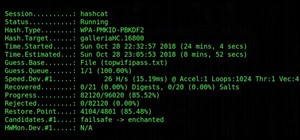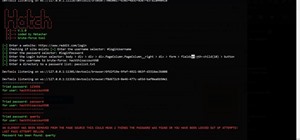I am looking for a way to test sql injections, but I don't really understand the idea well and dont want to break shit, I have backtrack 5 right now.
Please help. Thanx

I am looking for a way to test sql injections, but I don't really understand the idea well and dont want to break shit, I have backtrack 5 right now.
Please help. Thanx
 Forum Thread:
When My Kali Linux Finishes Installing (It Is Ready to Boot), and When I Try to Boot It All I Get Is a Black Screen.
8
Replies
Forum Thread:
When My Kali Linux Finishes Installing (It Is Ready to Boot), and When I Try to Boot It All I Get Is a Black Screen.
8
Replies Forum Thread:
HACK ANDROID with KALI USING PORT FORWARDING(portmap.io)
12
Replies
Forum Thread:
HACK ANDROID with KALI USING PORT FORWARDING(portmap.io)
12
Replies Forum Thread:
Hydra Syntax Issue Stops After 16 Attempts
2
Replies
Forum Thread:
Hydra Syntax Issue Stops After 16 Attempts
2
Replies Forum Thread:
Hack Instagram Account Using BruteForce
208
Replies
Forum Thread:
Hack Instagram Account Using BruteForce
208
Replies Forum Thread:
Metasploit reverse_tcp Handler Problem
47
Replies
Forum Thread:
Metasploit reverse_tcp Handler Problem
47
Replies Forum Thread:
How to Train to Be an IT Security Professional (Ethical Hacker)
22
Replies
Forum Thread:
How to Train to Be an IT Security Professional (Ethical Hacker)
22
Replies Metasploit Error:
Handler Failed to Bind
41
Replies
Metasploit Error:
Handler Failed to Bind
41
Replies Forum Thread:
How to Hack Android Phone Using Same Wifi
21
Replies
Forum Thread:
How to Hack Android Phone Using Same Wifi
21
Replies How to:
HACK Android Device with TermuX on Android | Part #1 - Over the Internet [Ultimate Guide]
177
Replies
How to:
HACK Android Device with TermuX on Android | Part #1 - Over the Internet [Ultimate Guide]
177
Replies How to:
Crack Instagram Passwords Using Instainsane
36
Replies
How to:
Crack Instagram Passwords Using Instainsane
36
Replies Forum Thread:
How to Hack an Android Device Remotely, to Gain Acces to Gmail, Facebook, Twitter and More
5
Replies
Forum Thread:
How to Hack an Android Device Remotely, to Gain Acces to Gmail, Facebook, Twitter and More
5
Replies Forum Thread:
How Many Hackers Have Played Watch_Dogs Game Before?
13
Replies
Forum Thread:
How Many Hackers Have Played Watch_Dogs Game Before?
13
Replies Forum Thread:
How to Hack an Android Device with Only a Ip Adress
55
Replies
Forum Thread:
How to Hack an Android Device with Only a Ip Adress
55
Replies How to:
Sign the APK File with Embedded Payload (The Ultimate Guide)
10
Replies
How to:
Sign the APK File with Embedded Payload (The Ultimate Guide)
10
Replies Forum Thread:
How to Run and Install Kali Linux on a Chromebook
18
Replies
Forum Thread:
How to Run and Install Kali Linux on a Chromebook
18
Replies Forum Thread:
How to Find Admin Panel Page of a Website?
13
Replies
Forum Thread:
How to Find Admin Panel Page of a Website?
13
Replies Forum Thread:
can i run kali lenux in windows 10 without reboting my computer
4
Replies
Forum Thread:
can i run kali lenux in windows 10 without reboting my computer
4
Replies Forum Thread:
How to Hack School Website
11
Replies
Forum Thread:
How to Hack School Website
11
Replies Forum Thread:
Make a Phishing Page for Harvesting Credentials Yourself
8
Replies
Forum Thread:
Make a Phishing Page for Harvesting Credentials Yourself
8
Replies Forum Thread:
Creating an Completely Undetectable Executable in Under 15 Minutes!
38
Replies
Forum Thread:
Creating an Completely Undetectable Executable in Under 15 Minutes!
38
Replies BT Recon:
How to Snoop on Bluetooth Devices Using Kali Linux
BT Recon:
How to Snoop on Bluetooth Devices Using Kali Linux
 How To:
Crack SSH Private Key Passwords with John the Ripper
How To:
Crack SSH Private Key Passwords with John the Ripper
 How To:
Perform Advanced Man-in-the-Middle Attacks with Xerosploit
How To:
Perform Advanced Man-in-the-Middle Attacks with Xerosploit
 How to Hack Wi-Fi:
Cracking WPA2 Passwords Using the New PMKID Hashcat Attack
How to Hack Wi-Fi:
Cracking WPA2 Passwords Using the New PMKID Hashcat Attack
 How To:
Hack Coin-Operated Laudromat Machines for Free Wash & Dry Cycles
How To:
Hack Coin-Operated Laudromat Machines for Free Wash & Dry Cycles
 How To:
Crack Password-Protected Microsoft Office Files, Including Word Docs & Excel Spreadsheets
How To:
Crack Password-Protected Microsoft Office Files, Including Word Docs & Excel Spreadsheets
 How To:
Exploit EternalBlue on Windows Server with Metasploit
How To:
Exploit EternalBlue on Windows Server with Metasploit
 How To:
Hack Apache Tomcat via Malicious WAR File Upload
How To:
Hack Apache Tomcat via Malicious WAR File Upload
 How To:
Spy on Traffic from a Smartphone with Wireshark
How To:
Spy on Traffic from a Smartphone with Wireshark
 How To:
Intercept Images from a Security Camera Using Wireshark
How To:
Intercept Images from a Security Camera Using Wireshark
 How To:
Find Anyone's Private Phone Number Using Facebook
How To:
Find Anyone's Private Phone Number Using Facebook
 How To:
Stealthfully Sniff Wi-Fi Activity Without Connecting to a Target Router
How To:
Stealthfully Sniff Wi-Fi Activity Without Connecting to a Target Router
 How To:
Crack Any Master Combination Lock in 8 Tries or Less Using This Calculator
How To:
Crack Any Master Combination Lock in 8 Tries or Less Using This Calculator
 Rainbow Tables:
How to Create & Use Them to Crack Passwords
Rainbow Tables:
How to Create & Use Them to Crack Passwords
 How To:
Use Mitaka to Perform In-Browser OSINT to Identify Malware, Sketchy Sites, Shady Emails & More
How To:
Use Mitaka to Perform In-Browser OSINT to Identify Malware, Sketchy Sites, Shady Emails & More
 How To:
Dox Anyone
How To:
Dox Anyone
 How To:
Use Burp & FoxyProxy to Easily Switch Between Proxy Settings
How To:
Use Burp & FoxyProxy to Easily Switch Between Proxy Settings
 How To:
Brute-Force Nearly Any Website Login with Hatch
How To:
Brute-Force Nearly Any Website Login with Hatch
 How to Hack Wi-Fi:
Stealing Wi-Fi Passwords with an Evil Twin Attack
How to Hack Wi-Fi:
Stealing Wi-Fi Passwords with an Evil Twin Attack
 How To:
Enumerate SMB with Enum4linux & Smbclient
How To:
Enumerate SMB with Enum4linux & Smbclient
8 Responses
>>cd /pentest/database/sqlmap (update with svn first)
sqlmap is a series of python scripts that automate searching for vulnerabilities in the target (also uses the Metasploit Framework for some of the payloads). There are a TON more options so I def recommend you -h and read some of them. Mainly the Tor and Proxy settings need to be configured before you start as you don't wan't to be v&.
The idea is, the website or service takes your input and turns it into a query for the database, to then return the data searched for. If the input is not cleaned up and stripped of special chars, then you might have the ability to run your own queries and gain extra info from the tables, or even execute arbitrary code. This is how Anonymous pulled off the HBgary attack, as well as most website defacement nowadays.
I can not stress enough. A mapping like this looks very mess on the server logs and you do not wan't your IP address all over that. Be smart and proxy up. Of course, you would not be doing that, and you are just testing on your own network ;)
My advice would be, before you start mapping out, read up a little bit on SQL. Once you understand the idea of a query and what it is doing, the rest will make more sense to you.
Yeah, take the time and learn everything thoroughly, don't try to be a skiddie. No one ever became a hacker by learning SQLi instead of SQL or XSS instead of JavaScript etc.
Thanks to both of you. Im very familiar with SQL and code in it daily. However, Im not good with ... um.. exploiting its weaknesses?
Well, maybe we can help you. What are you trying to exploit? You said you code a lot of SQL, do you understand the idea of injection?
The concept as I understand it, is exploiting input into applications, attempting to add/modify a query that is processing the application's input. With the effect of exposing data/tables/etc.
For example:
Application has enter name/password fields.
The query that processes it, would be : $query = mysql_query("SELECT `data`,`data` FROM `usertable` WHERE `name`='".$nameInput."' AND `password`='".$passInput."'",$database);
An injection would type into the name field:
"'",$database); >>>write new query<<<
1. Leaving the end of the ["'",$database);] blank would allow the script to continue running, as most developers, or good ones at least (like myself hehehe) would put ["'",$database) or die(mysql_error());] meaning the script would stop executing, because theres an error in the query.
2. adding your own query, you could put whatever you wanted to do in there and attempt to get the script to execute what you want instead.
Yes/no?
Yep! You pretty much nailed it. There are several different methods of injection but they are follow the same line. You are abusing the fact that user input is being directly parsed into a query and ran against the database. Good programming would negate that by sanitizing the input before it's actually ran. However this is not an common as one might think.
What SQLmap does is search for and attempt to exploit these vulnerabilities in a speedy and automated fashion. I am going to be writing an article on sqlmap because I find it to be critical to pentesting.
I would just add that the "or die()" piece is not enough to protect your DB. You want to make sure you escape any user inputs before passing them to your database.
There are very easy/standard ways to do this in every language out there. Since PHP is interpreted at runtime and is so easy to pick up, many people start building sites in it before they learn any of the security precautions. As a result, many of the sites susceptible to these kinds of attacks are written in PHP.
A good precaution would be to use stored procedures instead of defining dynamic SQL queries by concatenating strings in PHP (or whatever language of choice). This also gives you the added benefit of precompiled execution plans, which can speed your bigger & more common queries up.
Share Your Thoughts